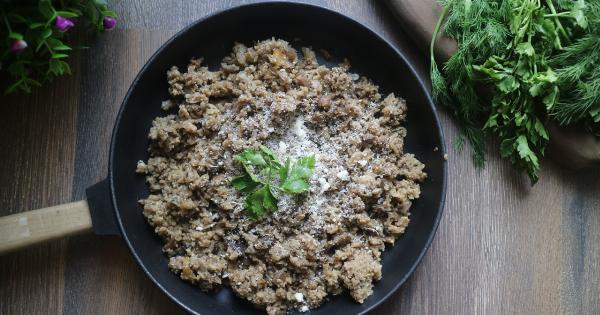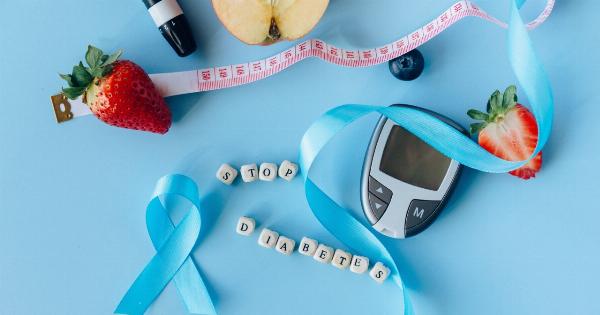If you’re following a ketogenic diet, you may already know that the primary focus is on limiting carbohydrates while increasing healthy fats and protein intake.
The goal of this low-carb, high-fat eating plan is to put your body into a state of ketosis, where it burns fat for fuel instead of glucose. While food choices are relatively straightforward on the ketogenic diet, deciding what beverages to consume can be a bit more challenging.
In this article, we will provide you with a comprehensive list of what you can and cannot drink on a ketogenic diet.
Water: Your Best Friend
When it comes to the ketogenic diet, water is undoubtedly your best and most trusted companion. It’s essential to stay hydrated, and water has zero carbs, calories, or additives, making it the perfect keto-friendly beverage.
Additionally, drinking water can help alleviate some common side effects of ketosis, such as dry mouth and bad breath. Aim to drink at least 8 cups (64 ounces) of water per day.
Keep Calm and Drink Tea
Luckily for tea lovers, most unsweetened teas are compatible with a ketogenic diet. Here are a few popular tea options:.
- Green Tea: Loaded with antioxidants, green tea offers numerous health benefits. It has virtually zero calories and carbohydrates, making it an excellent choice for keto.
- Black Tea: Like green tea, unsweetened black tea is low in carbs and can be enjoyed hot or iced. Just be careful if you prefer to add milk or sugar substitutes.
- Herbal Tea: There is a wide variety of herbal teas available, such as chamomile, peppermint, or rooibos. These teas are carb-free and can be a great way to relax and unwind.
Coffee: A Keto Favorite
Good news for coffee enthusiasts: black coffee is keto-friendly! It contains almost zero carbs and can be consumed in moderation. However, be cautious with added sweeteners, creamers, or flavored syrups, as they can quickly rack up your carb intake.
If you need to sweeten your coffee, consider using keto-friendly sweeteners like stevia or erythritol.
Nut Milks: Choose Wisely
Nut milks, such as almond milk or coconut milk, can be a tasty addition to your ketogenic beverage choices. However, not all nut milks are created equal. Some brands may contain hidden sugars or other additives that can increase your carb count.
Always read the labels carefully, and opt for unsweetened varieties with the lowest carb content.
Coconut Water: Proceed with Caution
While coconut water is often marketed as a natural hydrating beverage, it’s important to exercise caution when consuming it on a ketogenic diet.
Although it is relatively low in carbohydrates compared to other juices, it still contains around 9 grams of net carbs per cup. If you choose to include coconut water in your diet, be mindful of its carb content and factor it into your daily intake.
Natural Sodas: An Occasional Treat
Most traditional sodas are laden with sugar and are therefore off-limits on a ketogenic diet. However, there are some natural soda alternatives available that use low-carb sweeteners like stevia or erythritol.
While these options may be carb-reduced, they should still be consumed in moderation as part of your overall carbohydrate allowance.
Alcohol: Proceed with Extreme Caution
Consuming alcohol on a ketogenic diet can be markedly different from other diets. The body prioritizes alcohol metabolism over fat metabolism, potentially slowing down your progress.
Moreover, alcoholic beverages are typically high in carbs and can kick you out of ketosis. If you do choose to drink alcohol, opt for lower-carb choices like dry wines, spirits, or light beers in very moderate amounts.
Bone Broth: Nutritious and Keto-Friendly
Bone broth is a nutrient-rich, savory beverage that can provide several health benefits. It is packed with collagen, electrolytes, and essential minerals.
Enjoying bone broth can also help replenish electrolytes lost during the initial phase of the ketogenic diet. Opt for homemade or store-bought varieties that contain little to no added sugars or other high-carb ingredients.
Protein Shakes: Choose Carefully
Protein shakes can be a convenient way to supplement your protein intake on a ketogenic diet. However, not all protein powders are created equal. Some may contain added sugars, artificial sweeteners, or high-carb ingredients.
Look for low-carb protein powders made from high-quality sources such as whey protein isolate or collagen peptides.
Sparkling Water: A Bubbly Delight
If you’re craving the fizz of soda without the added carbs, sparkling water can be an excellent choice. It comes in various flavors and can be enjoyed plain or mixed with a squeeze of lemon or lime.
Just double-check the label to ensure there are no hidden sweeteners or other undesirable additives.
The Bottom Line: Choose Wisely for Ketogenic Success
When it comes to selecting beverages on a ketogenic diet, the key is choosing wisely. Opt for water as your primary drink of choice, and complement it with unsweetened teas, black coffee, and occasional natural sodas or sparkling water.
Remember to read labels carefully and be mindful of hidden sugars and additives that can derail your keto progress. By making smart choices, you can quench your thirst while staying in ketosis.


























